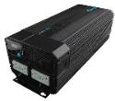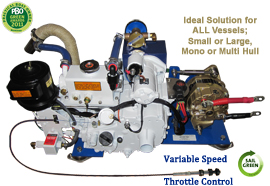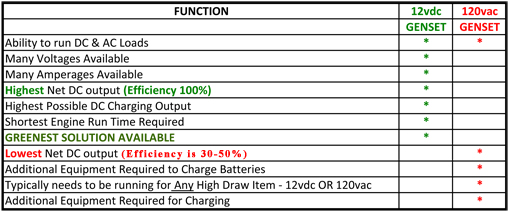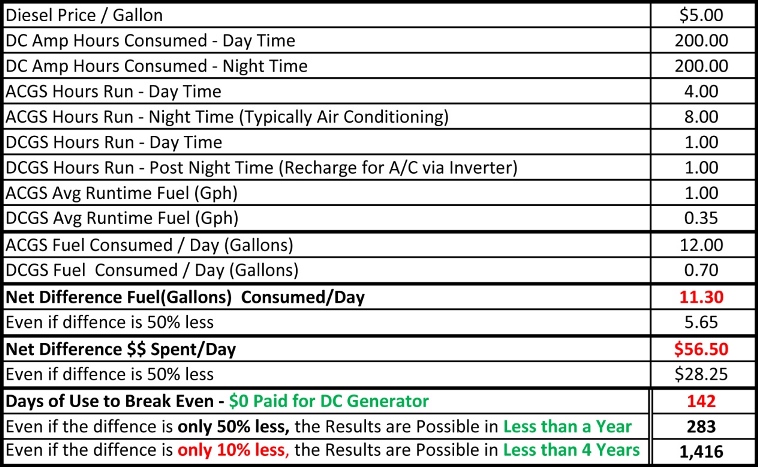To not clutter the article above with some raw data, informational input is shown below for the just have to know tech types.
• Largest boat dedicated charger available (12vdc - 60amp) produces only 30 amps (apx.) of charging power when run of off the boat's 120vac generator.
• Largest boat dedicated inverter/charger available (12vdc - 150amp) produces only 80 amps (apx.) of charging power when run of off the boat's 120vac generator.
• ZRD dedicated DC Generator produces 220 amps @ 12vdc in example, but it is available in many other voltages and amperages.
• ZRD dedicated DC Generator solutions do not require additional equipment in order to charge batteries or power large DC Loads.
• ZRD dedicated DC Generator solutions may produce up to 6,667% more amperage available for battery bank charging (1,250% for largest inverter/charger available).
• The ZRD ZDCGE1222 Generator solution typically requires only 7% of the engine run time a 30amp boat charger requires in order to charge (36% for 150amp inverter/charger).
• A simplified overview of the above may be explained in the following 2 examples:
| |
» A ZRD DC (Direct Current) Generator vs. a Standard 120Vac (Alternating Current) Generator has a 10 to 1 run time efficiency for typical overnight
air conditioning use. Next, a ZRD DC Generator vs. a Standard 120Vac Generator has an apx. 4 to 1 run time efficiency for fuel consumption. The Resultant Total efficiency is
up to 40 to 1 now. If you were to have a larger oversized AC generator (like many do), this number may easily exceed 100 to 1. Add in ZRD's forward thinking throttle control,
and efficiency soon doubles (200 to 1) or triples (300 to 1) by not needing to run a generator at full RPM all the time. AC generators have no option to do this feature - They
MUST BE RUN at FULL RPM whether 1% or 100% of amperage output is required.
» While cruising at anchor, charging the house battery bank using the installed standard shore charger running on 120Vac power supplied by an AC Generator (no
shore power available) it has an efficiency reduction of 9 to as low as 25 or more to 1 compared to when that same charger is powered via Reliable Good sourced 120VAC shore
power. Now, add in the engine run time required 1hr (DC Generator) vs. 3 or more (120Vac Generator) and the efficiency comparison changes to 27 or 75 or more to 1. Don't forget
the apx. 4 to 1 run time efficiency for fuel consumption and the Resultant Total efficiency for comparison may easily reach 108 (or even up to 300 or more) to 1. |
• The current battery bank condition (not charge state) is an item one always needs to be aware of and is one of the most misunderstood situations. Regardless if the
batteries are old or new, but are worn out from improper charging or maintenance, they will not be able to handle any load beyond a few amps.
A small load of a few amps (10-25) is
usually possible from a dead battery bank for many years after the batteries have died. However, if a large load is applied, the batteries
will immediately notify the boat operator that the batteries are in fact dead and are unable to supply the required higher demanding load. This is why the only way to know if your
battery bank is still good is to have an installed battery monitor (gives months of advance notice) and test it regularly with an actual load meter. See the following
FAQ that shows a load meter.
A Conversation regarding cheap portable generators.
Since the ZRD DC (Direct Current) Generator was introduced, we have received wonderful reviews and feedback. Although in a very small minority, we have received a few questions
similar to the following. Read their thoughts and our view regarding the underlying fundamental principles on different ways to approach a solution.
I read the ZRD FAQ on "Why choose DC (Direct Current) over AC (Alternating Current) when Selecting a Generator?". The case you put forth makes sense for traditional AC diesel
generators. It does not address the Honda series which is what everyone seems to be going with. I have one even though I'd much rather have a built in diesel. Sure, they
are not marinized, but they're inexpensive and they work well. I would love to be able to just turn on a switch and run a generator, No pulling cords to start, rigging shore
power cords, etc., filling gasoline tanks and schlepping them around. The Honda uses more fuel than my dingy. I just wanted to let you know that ZRD is missing a significant
portion of the cruising community by ignoring the Honda phenomenon.
Addressing "ZRD is missing a significant portion of the cruising ..." For any community that is willing to sacrifice on important, significant issues strictly over price,
ZRD's choice would be to bypass that community. ZRD will never provide an inferior solution in order to generate revenue - ever. ZRD always strives to provide the best
proper solution or none at all. We have passed and will continue to pass on prospective customer opportunities in order to not have our name attached to an inferior
solution they desire ZRD to manufacture or provide for them. We frequently tell customers that ZRD operates like the original Motorola from many years ago. Their company
philosophy had at is root, "99% is not good enough". Look what happened to them when they compromised on quality just in an attempt to "compete on price" alone.
The ZRD community understands our philosophy - "You Deserve Us".
In addressing the Honda scenario, the prospect made the direct case for us logistically on why not to use a portable generator in his own email. We do not need to expand on that
any further, but if you understand how inefficient an AC Generator is, just observe how much less efficient than even that your boats 30 or 60 amp charger is when running on a Honda.
Unfortunately, the most significant item he did not see at all and completely overlooked (because they are always blinded by price) was
Safety. We have not mentioned safety directly for the same reason. It is so obvious, significant, and the backbone of everything ZRD does.
ZRD will NEVER COMPROMISE on anyone's safety. This is a line in the sand for us - e.g. when a prospective customer wants an alternator for a gasoline engine without a spark
arrestor or operates a generator all night with no one monitoring in case a malfunctions occurs that will endanger lives. The same mentality that will accept using a portable
gasoline generator on a boat is the same thinking that does not wait 5 minutes for it to cool down before refilling when it runs out of gasoline. It probably ran out unexpectedly
due to its not being monitored. I am sure they also only use it in calm conditions because it is as stable as being on land - NOT, even on a cat, ... I can go on, but it is
apparently nothing they desire to hear, so why continue. Those of us that know, do not just do it, but Do it Better.
His and a few other emails are now addressed. This is an example of someone attempting to justify their "Wal-Mart" thinking - Cheaper wins over proper solutions. In the
bigger picture and long run, ZRD solutions are the most economical when ALL factors are considered. This is the underlying problem in corporate business today. Any company
run by an accountant(s) instead of a CEO that has a verifiable operational background and truly knows what he is doing is usually producing inferior products and is doomed to
eventual failure. They do not know how to think or make decisions outside of a spreadsheet. They are incapable of incorporating intrinsic values and costs into it. Those costs
and benefits are not easily quantifiable by accountants, but are known and valued accordingly by ZRD. ZRD will Never compromise on Quality or our customer's safety.
The case for a 120Vac Generator?
The answer is simple - If you desire or use your vessel as a
Floating Condominium forever on the hook, never at a dock, used very little on the open water, continually consuming an inordinate amount
of electricity to run all types of items and HVAC, with limited or non-existent supplemental solar and wind sources, have an
unlimited expense
($,$$$,...00)
budget, have an
unlimited continual access to diesel fuel, and have
no concerns about the environment, wildlife, or climate change,
then a 120Vac Generator may be the solution you should choose.
The difference between the two sources of electrical power is in the total time and amount of power consumption you will require per day - 400Ah vs. over 1,000Ah.
To meet these non-cruiser higher consumption needs with a 120Vac generator, daily run time durations of 16 to 24 hours are required
with its associated 15-25 gallons of daily fuel consumption, cost$, maintenance, noise, and obvious safety concerns.
ZRD manufactures DC Generators for most situations. If you have determined that you
"need" a quantity of
electrical power that is
beyond what the
majority of "standard cruisers" use, even after you have added supplemental electrical power in the form of solar panels and wind generator(s),
you may seriously need to
consider installing the ZRD model
ZDCGEUR (4Kw) DC Generator instead of the usually selected ZRD model ZDCGE1222. This enhanced output model allows for continuous unlimited run
time operations (similar to a 120Vac Generator), but without the extreme higher operating costs. And for those times that unlimited run time operations are not required, it still has
all of the advantages of a standard ZRD DC Generator.
For very large vessels (over 50' in length, typically over 60' or large catamarans) the
ZRD DCGDI2440 may plainly be your solution of choice. Again, in ZRD's opinion,
installing or using a 120Vac Generator should only be done in very limited situations.
Generator or Genset?
The words Generator and Genset are often used interchangeably. A generator or genset, consists of electricity production components (typically a DC Alternator or
AC Generator) combined with (connected to) an engine that provides the necessary rotational energy required for the electricity production components to produce their
electrical output. This combination of components is called an engine-generator set, gen-set, or genset. Most commonly, the engine is assumend and taken for granted
resulting in the combined engine with its electricity production component being called a generator. DC or AC is added for additional clarification as to which type
of electricity is being produced.
|



